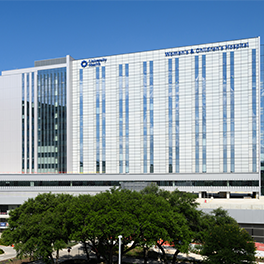Let the Women's & Children's Hospital experienced mother-baby caregivers guide and support you through your postpartum hospital stay. You’ll receive kind, helpful assistance so you and your newborn feel supported and cared for.
Rooming In
After birth, you’ll move to a postpartum room for bedside care and rooming in with your baby. Rooming in means you’ll bond with your baby and get a good start to breastfeeding while you stay together in the same room. Count on skilled, compassionate nurses to support you.
Comfortable Setting
Your private room provides ample space for you, your baby, your loved ones and our team. It also has a TV, shower, a small sleeper and extra furniture so your partner or loved one can visit and stay overnight with you. We can provide extra bedding and a pillow, and we’ll clean your room each day.
Breastfeeding
Partner with our board-certified lactation consultants and trained nurses for breastfeeding support during your stay and after you return home.
Secure, Locked Setting
Trust us to provide a safe, secure environment for you and your baby at the Women's & Children's Hospital. In the delivery room, you, your partner and your newborn will receive matching ID bracelets. An infant security ankle bracelet protects your baby. The postpartum unit is locked all the time.
Newborn Care
Depend on us to perform regular health checks and recommended newborn screening tests on your baby. After your newborn’s first 24 hours of life, a nurse will complete screenings for:
- Congenital heart disease
- Hearing issues
- Jaundice
- Metabolic and genetic disorders
If your baby needs a higher level of care after birth, the Women's & Children's Hospital has an advanced Level IV neonatal intensive care unit. Our specialized team has the highest level of advanced training and technology to care for babies born too early or with another health concern.
A Mother's Place
A special feature of the Women’s & Children’s Hospital is called the John L. Santikos Charitable Fund Mother’s Place. This will encompass all breastfeeding and breast milk storage services for mom and baby in one place.
Breast milk is a superfood for infants. It is about 87% water, and the rest is protein, fat, carbohydrates, vitamins and minerals, including calcium, potassium and sodium. The protein and fat in human milk is easier for babies to digest than cow’s milk.
Human breast milk is the best source of nutrition for newborns and helps protect them from infection and disease. A mother’s milk is naturally customized for their infant, and the milk changes over time to provide baby with what they need as they grow.
For these reasons, mothers should begin breastfeeding their infants within the first hour of life and for at least the first six months, if possible. One of our goals at A Mother’s Place is to support moms who choose to breastfeed.
A Mother's Place is easily accessible on the first floor of the hospital. It will complement University Health’s future Milk Bank, which will be the first one in South Texas and the third one in all of Texas.
Customized Breast Milk Creation and Storage
Breast milk is like medication and sometimes needs adjustments to be most effective.
At A Mother’s Place, our nutritionists can supplement your milk with calories, protein, calcium and phosphorus to support your baby’s bone growth and organ development. The milk is fortified to suit each newborn’s growth and developmental needs.
This is especially important for babies in the NICU with a very low birth weight. These babies need more protein, calcium and phosphate than what is naturally in mother’s milk to ensure they gain weight steadily.
The period of time when a baby is recovering in the NICU is also critical to his or her neurodevelopment. Ensuring your baby has the optimal nutrition with fortified milk is a key part of a successful recovery.
Customizing and fortifying breast milk for a baby’s specific needs is one of the best ways to ensure healthy development. Our nutritionists will fortify your breast milk and store it onsite at A Mother’s Place so we have it on-hand for your baby while they are in the NICU.
A Mother’s Place Services and Features
Our patients will have access to a variety of services and features including:
- Lactation support
- Breast milk storage
- Nutritional support for babies in the NICU
- Skin-to-skin contact support for NICU babies separated from their mothers
- Group support for mothers with babies in the NICU
Breastfeeding Support
Breastfeeding can be challenging. We’re here to help.
Our lactation consultants are specially trained to assist moms with their breastfeeding journey. We offer bedside consultations in the hospital, as well as virtual breastfeeding classes in English and Spanish.
We know how important breast milk is for your baby, and we want to help foster that special connection between you and your baby. Everyone has questions, so please don’t hesitate to ask.
Visitors
Your friends and family are welcome to visit daily from 8 a.m. to 8 p.m. The number of visitors allowed varies by unit, so call ahead or ask your nurse.
Children are welcome to visit but must be supervised by an adult at all times. For your privacy and security, visitors must enter using the doorbell system on the unit.
Meds to Beds Program
Take advantage of our Meds to Beds program if you need medication before leaving the hospital. Our pharmacy delivers directly to your room, so you don’t have to make a stop on your way home.
Birth Certificates
Complete a birth registry application for a birth certificate before you go home. Our staff will handle the rest of the paperwork and file it.
Returning Home
On the day you leave the hospital, expect to go home before noon so you will have time to settle in at home and enjoy the rest of the day.
Baby Blues and Postpartum Depression
It’s normal to feel a wide range of emotions after having a baby. Feeling a little sad is known as the baby blues. These feelings may last from a few days up to two weeks after birth.
If your baby blues last longer than two weeks, you may be experiencing postpartum depression. Our behavioral health specialists can help. Find a women's health clinic with a behavioral specialist near you.
Follow-Up Care
Your patient navigator will set up follow-up appointments before you leave the hospital. During the follow-up visits, your doctor will check the health and well-being of you and your baby and answer any questions you have.





